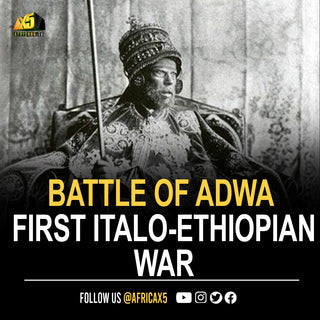
BATTLE OF ADWA, FIRST ITALO-ETHIOPIAN WAR
Emperor Menelik II and Empress Tatyu Betul led the Ethiopian army to a decisive victory against the Italian army during the battle of Adwa. Ethiopia is the only African country that was never colonized during Europe’s invasion of the African continent. The Battle of Adwa was the climactic battle of the First Italo-Ethiopian War. The Ethiopian forces defeated the Italian invading force on Sunday 1 March 1896, near the town of Adwa.
Ethiopians commanded an army of Lions, Cheetahs, bees, and elephants which directly led to their victory against Italians. The Ethiopians surrounded the Italians for two weeks and, upon Empress Tayitu's advice, cut off the fort's water supply. At the battle of Adwa, Ethiopian warriors proficient in sword warfare known as Shotel decimated the invading Italian soldiers in hand-to-hand combat, resulting in a resounding African victory.
The Italian commander agreed to surrender if they would be allowed to leave with their firearms. Menelik agreed that they could leave the garrison unharmed. In an embarrassing turn of events the Italians were forced to relinquish their arms to the Ethiopian army, were subdued and escorted to their ships were they were allowed to return home in defeat.
By the end of the 19th century, European powers had carved up almost all of Africa after the Berlin Conference; only Ethiopia and Liberia still maintained their independence. Adwa became a pre-eminent symbol of pan-Africanism and secured Ethiopian sovereignty until the Second Italo-Ethiopian War forty years later.


